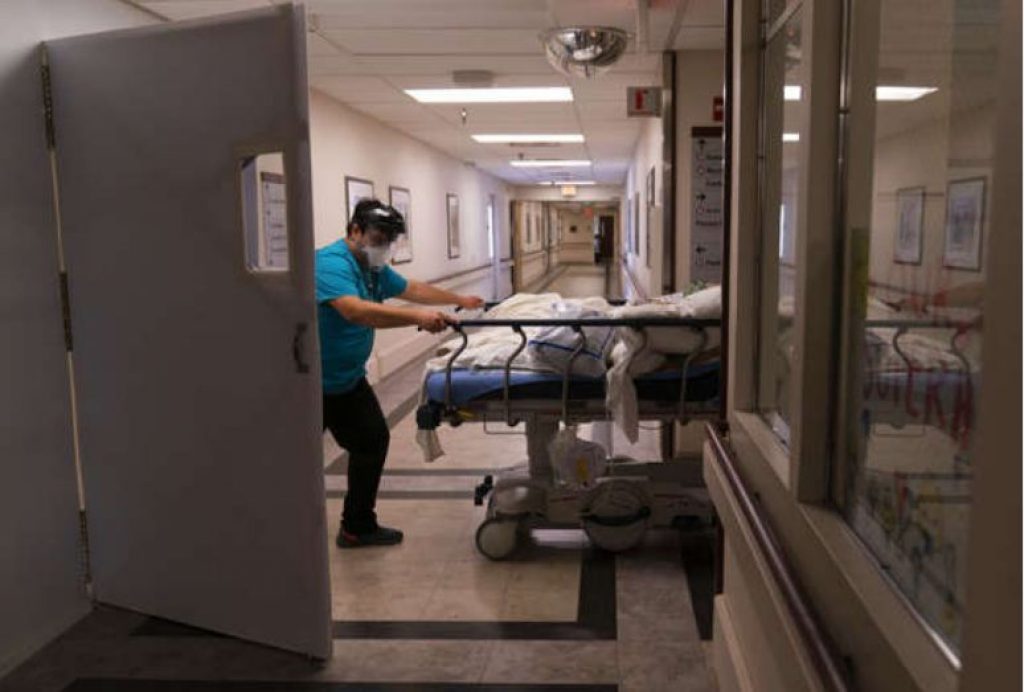Telemundo News
For doctors at the University of Arkansas, a flood of new COVID-19 cases and the dwindling availability of hospital beds makes it feel like they are going back in time at the end of 2020.
His latest projections suggest that coronavirus hospitalizations across the state will triple in the next two weeks , which would mean returning to a chaotic period where staff and resources to combat the disease were in short supply, surgery was difficult to carry out. scheduled, and the crisis seemed to have no end in sight.
If that happens, “we will overcome what was seen last winter,” said Dr. Steppe Mette, executive director of this medical center in Little Rock.
[New cases of COVID-19 have increased 109% in the last week due to the delta variant]
On Monday, the hospital was treating 57 hospitalized patients with COVID-19, up from eight cases six weeks ago, Mette explained.
“This is the big concern,” he added, “at the moment we are handling it well, but the cases are increasing. We are physically placing patients in places that we normally would not have put them due to high demand.”
While coronavirus cases have risen across the country, in the South they have re-emerged explosively. In Arkansas, Alabama, Louisiana and Tennessee, the spread of the delta variant , low vaccination rates and lax attitudes towards COVID-19 could lead to a rebound in the pandemic not seen in months, according to local public health authorities.
Mississippi’s top health official, Dr. Thomas Dobbs III, posted on Twitter on Monday that a fourth wave of the virus is already affecting the state, and regretted that it had not been prevented.
Dobbs warned over the weekend that beds in intensive care units (ICUs) were “becoming scarce,” and that 11 of the state’s major ICUs were no longer available. There are currently 138 places in these units, the lowest number in the state since March.
Meanwhile, COVID-19 hospitalizations in Mississippi reached 369 this weekend , a number that had also not been seen since March, with about 34% of patients in intensive care. During the last three weeks, hospital admissions increased by more than 200% in this state.
[For the sixth consecutive day, Los Angeles reports 1,000 new cases of COVID-19 every 24 hours]
Almost all of the new cases can be attributed to the delta variant, Dobbs said on a radio show Monday. With an average of about 800 new cases a day, infections tripled in the last week.
“Especially we are seeing a big increase in children, adolescents and young adults, because [the economy] reopened in the summer, there are low vaccination rates and little immunity in those groups,” explained Dobbs, adding that there has been an increase alarming in the number of healthy adults aged 40 years in intensive care.
Dobbs remains an arduous advocate for wearing masks and avoiding social gatherings , even as Republican Gov. Tate Reeves ended sanitary restrictions in early March, claiming that “hospitalizations and the number of cases plummeted. and the vaccine is being distributed rapidly. “
This month the Mississippi Department of Health however announced new recommendations to help prevent the spread of the delta variant, asking residents 65 and older to avoid mass gatherings indoors, regardless of whether they have been vaccinated, and calling all residents over 12 years of age to get their coronavirus injection.
Studies have shown that COVID-19 vaccines are highly safe and effective. But misinformation continues to cast doubt on them, especially in rural and more conservative areas.
[Are vaccines safe for pregnant and nursing babies? The data is “reassuring”]
Arkansas Governor Republican Asa Hutchinson – who has been on a statewide tour after assuming the position of president of the National Governors Association – urged the federal government to approve the regular use of the vaccines, rather than continuing with the emergency authorization, arguing that this would give more certainty to the population that still has reserves.
“Let me be clear: I’m not asking you to trust the government ,” Hutchinson said at a rally in Texarkana last week, as reported by The Associated Press news agency. “I’m asking you to watch, do your own research, talk to people you trust, and that’s the right approach for me, “he added.
It’s a different approach than other Republican governors, who portray health officials as their adversaries while trying to control the pandemic.
Florida Governor Ron DeSantis has been selling T-shirts and other products with the slogan “Don’t Fauci My Florida” (which translates something like “No to Fauci in my Florida”), in reference to the government’s leading expert federal in infectious diseases.
In Missouri, Republican Gov. Mike Parson has suggested that some health officials are trying to scare people into getting vaccinated. In Tennessee, the top vaccination official was fired amid protests in the state Republican Party against her effort to vaccinate all teenagers.
[This young man regrets not getting vaccinated: he fell ill with COVID-19 and needed a double lung transplant]
Mette, from the University of Arkansas for Medical Sciences, said convincing more people to get vaccinated is key if the increase in cases is to be reversed . Although he said that forcing people to inoculate would only deepen the division that already exists in a state in which it will take a lot of one-on-one convincing or a deepening of the crisis for people to change their minds.
“People have listened to our messages ad nauseam, but seeing patients who have trouble breathing and who regret not having been vaccinated can make a difference. Those are real people who are getting seriously ill,” he added.
